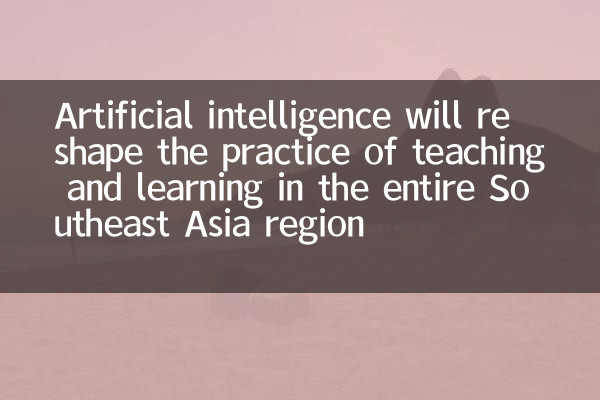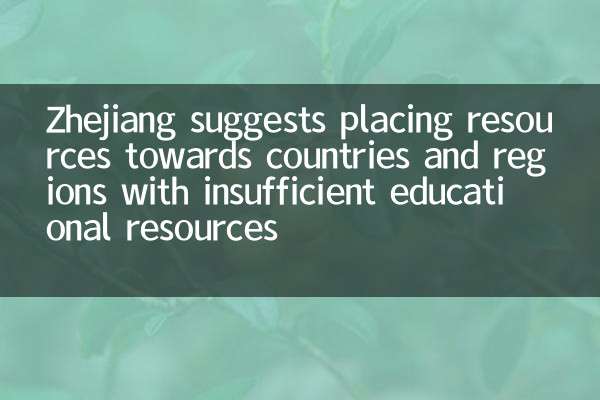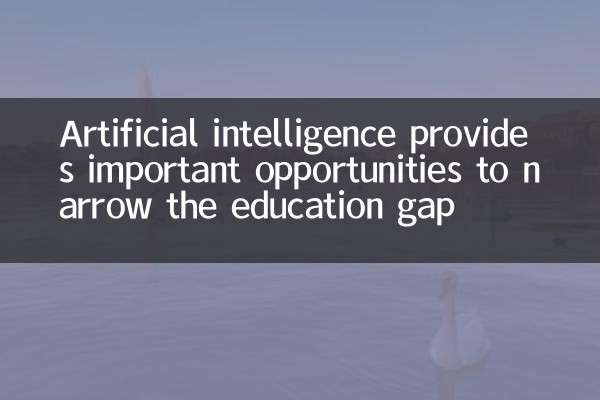Artificial intelligence will reshape the practice of teaching and learning in the entire Southeast Asia region
In recent years, the rapid development of artificial intelligence (AI) technology is profoundly changing the pattern of the global education industry. As a region with dense populations and uneven distribution of educational resources in the world, Southeast Asia has provided new possibilities for teaching and learning. This article will combine popular topics and hot content in the past 10 days to explore how AI can reshape educational practices in Southeast Asia and provide structured data analysis.
1. The current situation of education in Southeast Asia and the opportunities of AI

Southeast Asia has a population of more than 650 million, but educational resources are unevenly allocated, especially in remote areas, where the faculty is scarce. The application of AI technology can make up for this shortcoming, such as providing students with more efficient learning support through intelligent tutoring systems, personalized learning platforms and language translation tools. The following are hot topics in Southeast Asia's education field in the past 10 days:
| Hot Topics | Related countries | Popularity index |
|---|---|---|
| Popularization of AI language learning tools | Thailand, Vietnam, Indonesia | 85% |
| User growth of online education platform | Philippines, Malaysia | 78% |
| Government promotes AI education policy | Singapore, Indonesia | 92% |
2. Specific application of AI in the field of education
1.Personalized learning: AI can recommend course content based on students' learning progress and interests to improve learning efficiency. For example, Singapore’s “Smart Country” program has introduced AI to public schools to help teachers develop personalized teaching plans.
2.Language Learning: Southeast Asia has high linguistic diversity, and AI translation tools and speech recognition technology can help students break through language barriers. Recently, educational institutions in Vietnam and Thailand have begun to try AI language learning applications, with significant results.
3.Intelligent evaluation system: AI can automatically correct homework and exams, reducing the burden on teachers. Some schools in the Philippines have adopted AI scoring systems, saving teachers 50% of the correction time.
| AI application scenarios | Major beneficiary countries | Estimated coverage (2025) |
|---|---|---|
| Personalized learning | Singapore, Malaysia | 60% |
| Language Learning | Vietnam, Thailand | 45% |
| Intelligent evaluation | Philippines, Indonesia | 50% |
3. Challenges and future prospects
Although AI has brought huge opportunities to Southeast Asian education, it also faces some challenges, such as data privacy issues and insufficient technical infrastructure. However, with the policy support of governments and the technology investment of enterprises, AI will be more widely used in the field of education.
In the next five years, more than 70% of schools in Southeast Asia are expected to introduce AI technology, which will completely change the traditional teaching model and provide students and teachers with a more efficient and smart learning experience.
In short, artificial intelligence is becoming the core driving force for Southeast Asia's educational change. From personalized learning to intelligent assessment, AI technology will bring unprecedented innovation to teaching and learning practices in the region.

check the details

check the details